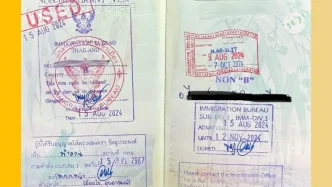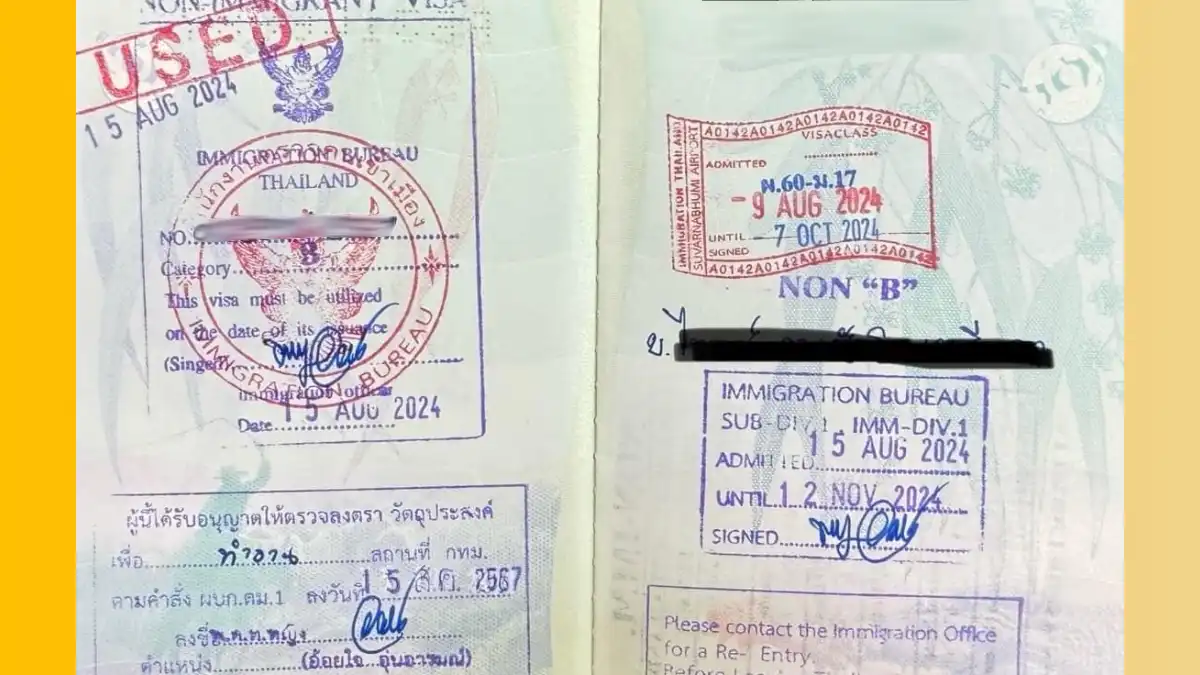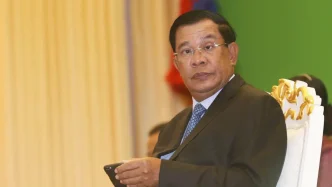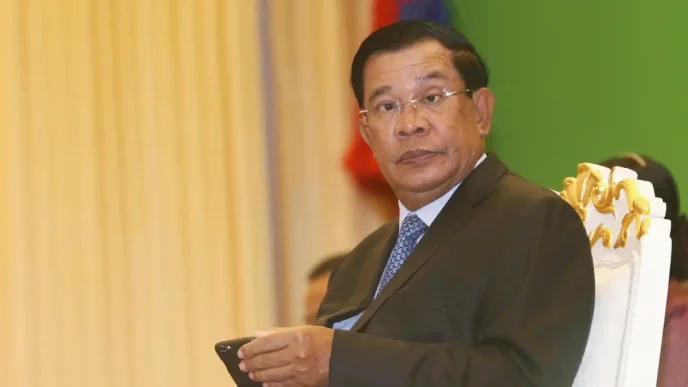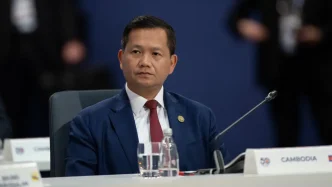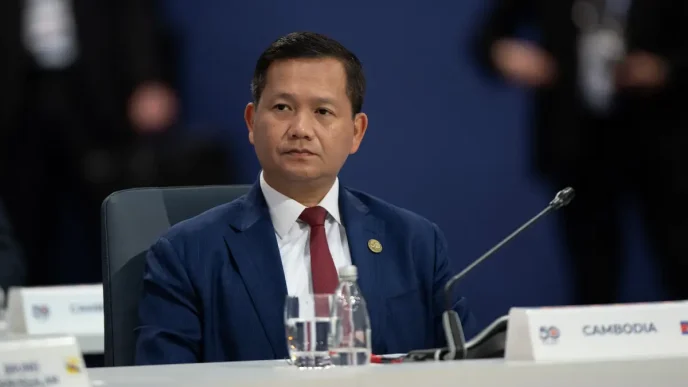Thailand’s Immigration Bureau has launched a sweeping crackdown on foreign nationals, spurred by the recent arrest of two individuals for passport forgery in Bangkok on August 4, 2025. The arrests, involving a Taiwanese and a Chinese national, have intensified scrutiny of immigration violations at a time when Thailand grapples with heightened regional tensions, particularly with Cambodia, over allegations of espionage. As border controls tighten, authorities are signaling zero tolerance for forged documents, amid fears that such breaches could undermine national security.
Passport Forgery Sparks Nationwide Enforcement
The incident that triggered this wave of enforcement unfolded in Bangkok, where immigration officers uncovered a forged entry stamp in the passport of a Chinese national, identified as Mr. Zhang, aged 39. Accompanied by a Taiwanese national, Mr. Tsai, aged 40, Mr. Zhang was applying for a work visa extension online when officers from Division 1 of the Immigration Bureau detected irregularities. The tampered stamp, originally granting a 60-day tourist stay, had been altered to display “NON-IB” to falsely justify an extended stay. While Mr. Zhang denied knowledge of the forgery, Mr. Tsai admitted to altering the document. Both now face severe charges—Mr. Tsai for forging an official travel document and Mr. Zhang for using a forged one—and have been handed over to prosecutors for legal action.
The penalties for such violations under Thai law are stringent. According to Section 12 of the Immigration Act B.E. 2522 (1979), forging or using forged immigration documents can result in up to seven years in prison, a fine of up to 70,000 Thai Baht (~US$1,960), or both. Additional charges under the Criminal Code B.E. 2551 (2008) for document forgery could lead to further imprisonment of up to seven years and fines as high as 140,000 Thai Baht (~US$3,920). The Immigration Bureau’s Commissioner, Pol. Lt. Gen. Panumas Boonyalak, has reiterated the agency’s commitment to rooting out such crimes, emphasizing the importance of maintaining the integrity of Thailand’s borders.
Regional Tensions and Espionage Fears
The timing of the arrests has amplified public and official concern, as Thailand navigates a delicate geopolitical landscape. Allegations of espionage, particularly involving Cambodia, have heightened sensitivities around border security. Thai intelligence agencies have voiced concerns that fraudulent documents could be exploited by foreign nationals to engage in covert activities, though no direct connection between the forgery case and espionage has been established. Surveillance at border checkpoints, especially along the Thai-Cambodian frontier, has been ramped up in recent months following reports of suspicious activities.
Thailand and Cambodia share a history of strained relations, marked by territorial disputes such as the long-standing conflict over Preah Vihear, a temple complex straddling their border. Recent claims of espionage have further soured ties, prompting both nations to bolster security measures. Thai authorities fear that lax immigration controls could be a weak link in national defense, particularly in sensitive border regions where illicit cross-border movement is a persistent challenge. The forgery incident, while isolated, has become a focal point in broader discussions about how to safeguard sovereignty without alienating foreign visitors who contribute significantly to Thailand’s tourism-driven economy.
Escalating Enforcement and Deportations
The Immigration Bureau’s response to these concerns has been robust. Over the past year, enforcement actions have surged, with approximately 12,500 foreign nationals deported from Thailand between July 2024 and June 2025 for immigration violations, including overstaying visas and using fraudulent documents. During the same period, around 18,000 individuals were denied entry at Thai borders, primarily due to invalid or suspicious travel papers. These figures reflect a significant uptick in enforcement compared to previous years, driven by a renewed focus on security.
Technological advancements are also playing a role in this crackdown. Enhanced passport scanning systems have been deployed at major entry points like Suvarnabhumi Airport to detect forgeries more effectively. The bureau’s deputy commissioner emphasized the importance of these measures in a recent statement, noting that rigorous checks are vital to protecting Thailand’s sovereignty. These efforts are part of a broader strategy to ensure that immigration laws are not exploited amid rising regional tensions.
Public Sentiment and Social Media Reaction
The forgery case has ignited a public debate about the balance between stringent immigration policies and Thailand’s reputation as a welcoming destination. On social media platforms like X, hashtags such as #ThaiImmigration and #BorderSecurity have gained traction, with posts reflecting growing unease about foreign nationals exploiting the visa system. Social Media erupted with commentary with one user capturing likes and supporting sentiment: “Thailand’s borders must be protected from those who break our laws.” Yet, there are also calls for moderation, with some users urging authorities to avoid policies that could deter tourists and expatriates who form a vital part of the economy.
This public discourse underscores the complexity of the issue. Thailand’s tourism sector, which accounts for a significant portion of GDP, relies heavily on foreign visitors. Overzealous enforcement risks alienating genuine travelers, while insufficient oversight could compromise security. Striking the right balance is a challenge for policymakers, particularly as the country seeks to project stability and openness within the ASEAN region.
Regional Implications and Bilateral Challenges
Beyond Thailand’s borders, the immigration crackdown carries implications for regional dynamics. Cambodia, while not directly commenting on the forgery incident, has been strengthening its own border security measures in response to similar concerns. The mutual suspicion between the two neighbors could hinder cooperation on shared challenges like cross-border crime and migration, potentially straining the broader framework of ASEAN unity. As both nations prioritize national security, the risk of miscommunication or escalation over minor incidents looms large.
The forgery case also highlights the broader difficulties of managing cross-border movement in a region marked by geopolitical frictions. Thailand’s actions, while domestically driven, resonate across Southeast Asia, where other nations face similar dilemmas. The challenge of distinguishing between legitimate travelers and potential threats is a shared one, and Thailand’s approach—combining technological innovation with strict enforcement—may serve as a model or a cautionary tale for its neighbors.
A Delicate Balancing Act
As Thailand intensifies its immigration crackdown, the government faces the dual task of safeguarding national security and preserving its image as a global hub for tourism and investment. The arrests of Mr. Tsai and Mr. Zhang are a stark reminder of the vulnerabilities posed by document forgery, especially in a climate of heightened vigilance. With deportations and entry denials on the rise, and severe penalties for immigration violations, foreign nationals in Thailand are under unprecedented scrutiny.
Yet, the long-term impact of these measures remains uncertain. Will they deter future violations, or will they strain Thailand’s relations with its neighbors and global partners? The answer hinges on how effectively the government can navigate the intersection of security and openness. For now, the Immigration Bureau’s firm stance signals a clear priority: protecting national interests amid complex regional dynamics. As these policies evolve, their ripple effects on Thailand’s economy, diplomacy, and regional standing will be closely watched.

